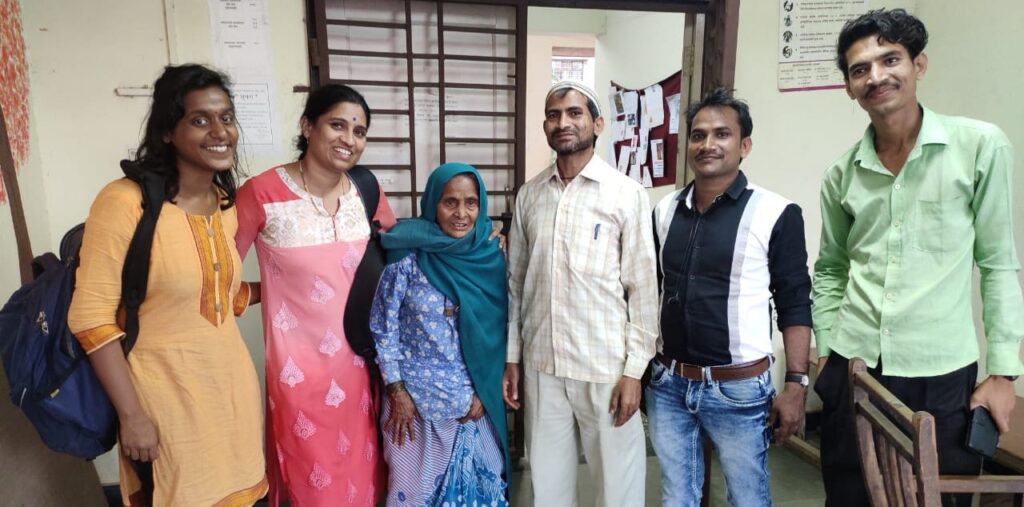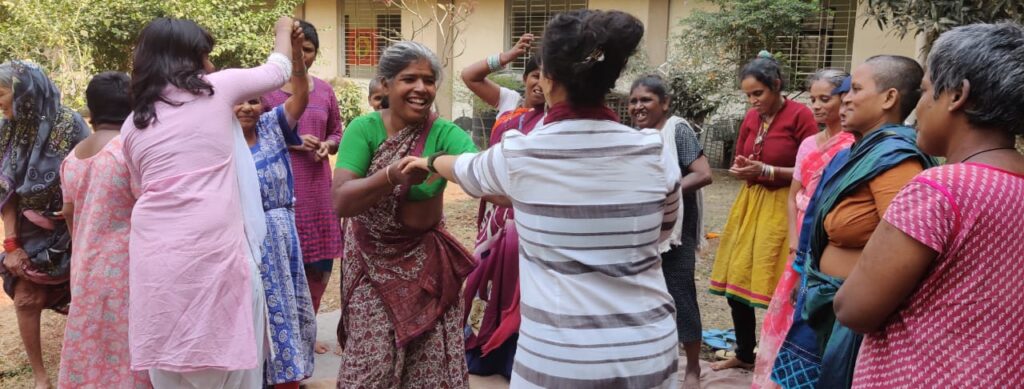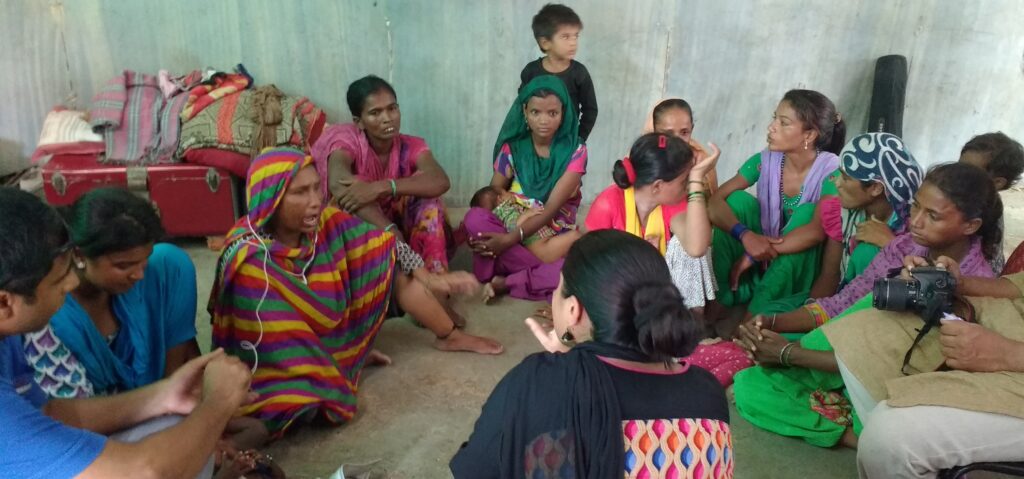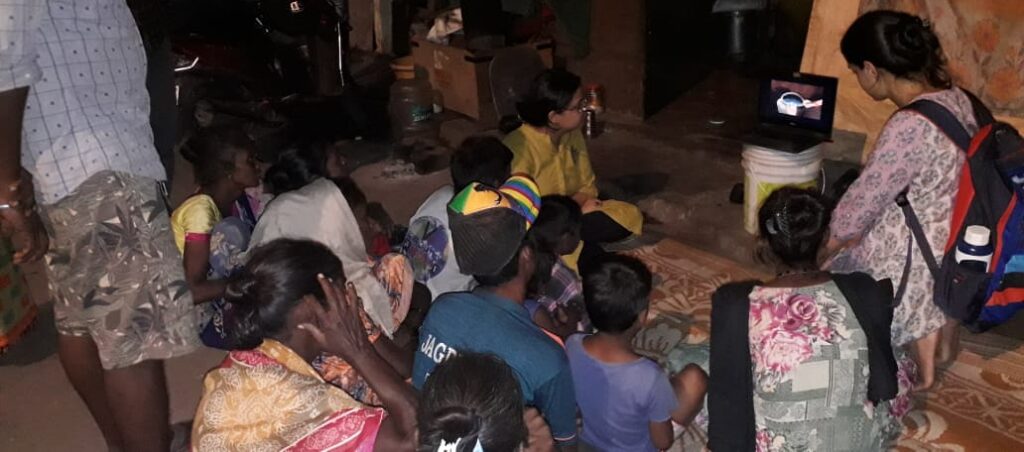Programmes
Art based activities
Art based activities ensure that women and men have a space to explore their talents by participating in various activities that they enjoy. They are free draw, paint, read, write, listen to music, watch movies, dance and feel alive. In this programme, individuals are free from any labels and have an opportunity to discover themselves. It ensures that people in custodial settings have a dignified and loving environment that is therapeutic.
Counselling
People living in custodial settings have undergone relentless trauma due to rejection, abandonment, abuse and lack of love. Furthermore, the apathetic condition of custodial settings adds to their mental illness. Thus, through counselling, people in custodial settings have an opportunity to heal their brokenness. It provides them comfort and support. Furthermore, counselling is an important aspect to ensure rehabilitation. When the counsellor understands the mental distress of an individual, the case worker can plan out the process of rehabilitation of the client.
Mental Health Intervention
Most of the individuals in Beggars Home experience severe trauma and do not have access to mental health resources. Thus, as an organisation we place a lot of importance to ensure that mental health intervention is provided to individuals in Beggars’ Home. During different sessions our counsellor offers trauma informed psychotherapy which falls in line with our core value of treating every individual with respect and dignity. In addition, we have formed networks with different psychiatric departments to ensure that individuals are provided with psychiatric care at these departments.

Medical Intervention
We have formed a network with different hospitals to ensure that individuals from Beggars’ Home, as well as destitute have access to medical treatment. Destitute are vulnerable to a number of diseases due to their environment; and thus, this program is crucial in order to ensure that they are not deprived of medical support.
Family Reunification
We initiated this program in 2006 in Beggars’ Home. This program initiates the process of family tracing and release by helping an individual contact their family members, friends or employer when they are arrested. In addition, this program also gives detained inmates an opportunity to communicate with their loved ones which comforts them. Till date, this program ensures that lost family members are reunited together.

Institutional Placement Programme
Women and men in Beggars’ Home have been denied opportunities to access education and enhance their skills which constantly pushes them into poverty. Thus, focusing on training to enhance their capacities was an important step to rehabilitate individuals in Beggars Home. Trainees have been given an opportunity to sit for classes that develop their skills and are finally assessed by an external that is followed by a selection process for employment opportunities. Vocational skill building thus becomes a powerful tool to ensure that people have an opportunity to be financially independent and start their lives anew.
Recreational Activities
Recreational Activities inside institutions to create a positive environment: Recreational activities play an important role in ensuring that women and men get an opportunity to step outside their barracks and have fun. Women and men enjoy playing outdoor games as well as indoor games. Different festivals are also celebrated in custodial settings so that a homely atmosphere is created among everyone. It also gives them an opportunity to dance, sing, recite poetry in front of everyone which increases their self-confidence.

Livelihood Support
Livelihood support is an important step to rehabilitate people in Beggars Home. Under this initiative, employers in the informal sector are brought together in order to ensure placement opportunities for the detained in Beggars Home. It is an effective tool to provide livelihood opportunities for detained inmates so that they can be self-reliant. This program also plays an important role in creating awareness about the unjust Beggary Law among members among the employers and asks them to support their employees in case of an unlawful arrest. Thus, this approach aims to provide legal protection as well as ensure economic and social stability after their release for people in Beggars Home.
Advocacy towards repeal of Anti-Poor Beggary Law
We have been campaigning against the Prevention of Beggary Act, 1959 that criminalises the act of begging before the Delhi High Court. In the year 2018, Delhi High Court struck down the law and decriminalised Beggary. We were a part of A special committee that Ministry of Social justice and empowerment drafted: Persons in Destitution (Protection, Care, Rehabilitation) Model Bill 2016, with the objective of incorporating rehabilitation centres for the homeless in each district.

Alliance Building and Networking
Alliance Building and Networking with multiple stakeholders towards creation of a lobby of organisations working with homeless and destitute populations – We have created a network and a lobby with organizations working with destitute, women, elderly and mental health. This network has been created in order to ensure rehabilitation of individuals from Beggars’ Home as well as the population living on the street. We also have created a network with lawyers across states in order to protect the legal rights of the homeless population.
Training of Institutional Staff
Workshops and seminars are organized for the institutional staff in order to sensitize them about the issues of the homeless. Superintendents and Probation Officers have separate workshops where they are trained to conduct special releases in their respective Beggars Home. Furthermore, workshops are also organized for the caretaking staff of institutions under the Women Child Welfare Department so that they treat individuals who are detained with love and dignity. Throughout the workshops they are also appreciated for their work, which motivates them to do their roles better. Thus, the aim of the workshop is to ensure that people working with custodial institutions are sensitized about the issue of destitution and treat detained individuals with care as equals.

Youth Engagement Program
Youth Engagement Program with college youth to develop their spirit of volunteerism and positive engagement towards responsible citizenship- Koshish began as a student initiative and thus believes that students have tremendous potential to make a difference. Every year Social work students are placed for their Field work with us so that they understand homelessness, poverty and the nature of Beggars Home. We also have a number of student interns and volunteers from different educational backgrounds who contribute in case work, family tracing and repatriation process. Students and volunteers play an important role in strengthening our work.
Community-based Intervention
Community based intervention, linking the clients with existing government schemes while enhancing their capacities through range of interventions to exit destitution- Providing destitute children with educational opportunities is an important intervention with homeless communities. Children are enrolled in schools so that they have an opportunity to attend school and break the vicious cycle of illiteracy. Furthermore, a number of communities do not have any verification documents, thus during community intention their Aadhar Cards, Ration cards and voter IDS are prepared in order to ensure that they are linked to various social security schemes. Through vocational training communities are also provided with alternative livelihood opportunities so that they are not pushed into begging.

Community Library
Community based intervention, linking the clients with existing government schemes while enhancing their capacities through range of interventions to exit destitution- Providing destitute children with educational opportunities is an important intervention with homeless communities. Children are enrolled in schools so that they have an opportunity to attend school and break the vicious cycle of illiteracy. Furthermore, a number of communities do not have any verification documents, thus during community intention their Aadhar Cards, Ration cards and voter IDS are prepared in order to ensure that they are linked to various social security schemes. Through vocational training communities are also provided with alternative livelihood opportunities so that they are not pushed into begging.
ᅠ
Night Outs
It is during the night; one would truly understand the helpless situation of the homeless population. Thus, a Night Out is an effective mechanism to reach out to the most vulnerable population living on the streets. During the night out we connect people living on the streets to the nearest shelter so that they can spend the night under a roof. In case of a medical emergency, they are also taken to hospitals. Night outs have also played an important role in identifying different locations of homeless communities so that interventions can be provided. Through the years it has also been an effective tool to activate the Government Rescue Program to ensure that adequate help is provided to people without any delay.

Research and Knowledge Generation
Various action research and studies are carried out to build on our understanding of the issue. Some of the frameworks that we developed for the purpose of clients rehabilitation, from our experience over the years, are now being developed into manuals that are freely available for all stakeholders.
ᅠ
